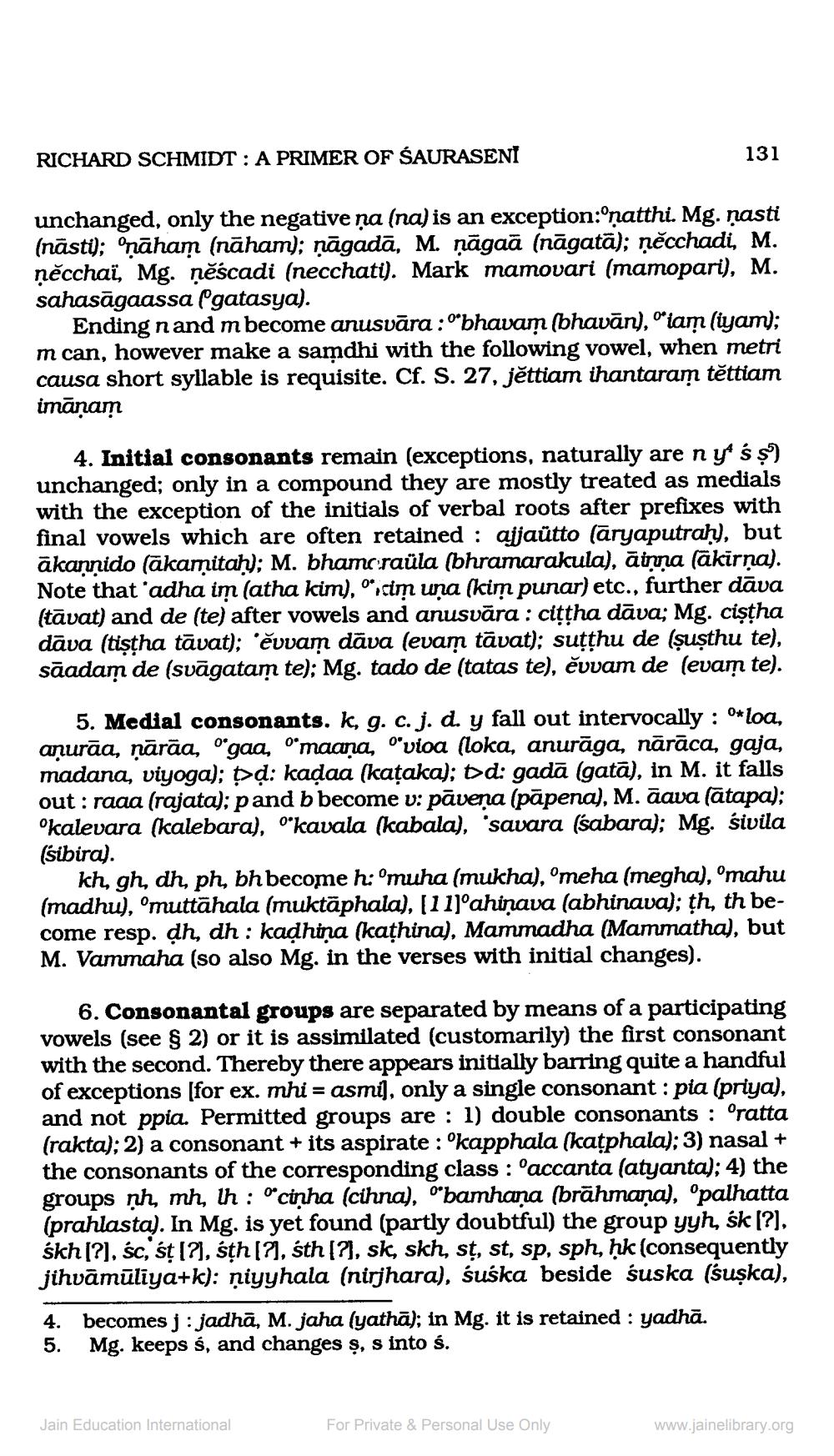________________
RICHARD SCHMIDT : A PRIMER OF ŚAURASENİ
131
unchanged, only the negative na (na) is an exception:oņatthi. Mg. nasti (năsti); ņāham (nāham); ņāgadā, M. ņāgaā (nāgatā); ņěcchadi, M. ņěcchaï, Mg. něścadi (necchati). Mark mamovari (mamopari), M. sahasāgaassa logatasya).
Ending nand m become anusvāra :'bhavam (bhavān), Oʻiam (iyam); mcan, however make a samdhi with the following vowel, when metri causa short syllable is requisite. Cf. S. 27, jěttiam ihantaram téttiam imāņam
4. Initial consonants remain (exceptions, naturally are nyt ś ) unchanged; only in a compound they are mostly treated as medials with the exception of the initials of verbal roots after prefixes with final vowels which are often retained : ajjaütto (āryaputrahy, but ākaņņido (ākasitaḥ); M. bhamcraüla (bhramarakula), āirna (äkirņa). Note that adha im (atha kim), * cim una (kim punar) etc., further dāva (tāvat) and de (te) after vowels and anusvāra : cittha dāva; Mg. cistha dāva (tiştha tāvat); čuvam dāva (evam tāvat); sutthu de (şuşthu te), sāadam de (svāgatam te); Mg. tado de (tatas te), čuvam de levam te).
5. Medial consonants. k, 9. c. j. d. y fall out intervocally : O*loa, anurāa, ņārāa, "gaa, omaana, ovioa (loka, anurāga, nārāca, gaja, madana, viyoga); pļ: kadaa (kataka); tod: gadā (gatā), in M. it falls out: raaa (rajata); pand b become v: pāveņa (pāpena), M. āava (ātapa); okalevara (kalebara), "kavala (kabala), 'savara (sabara); Mg. śivila (sibira).
kh, gh, dh, ph, bh become h: 'muha (mukha), 'meha (megha), 'mahu (madhu), 'muttahala (muktāphala), (1 1Joahiņava (abhinava); th, th become resp. dh, dh : kadhiņa (kathina), Mammadha (Mammatha), but M. Vammaha (so also Mg. in the verses with initial changes).
6. Consonantal groups are separated by means of a participating vowels (see & 2) or it is assimilated (customarily) the first consonant with the second. Thereby there appears initially barring quite a handful of exceptions (for ex. mhi = asm), only a single consonant: pia (priya), and not ppia. Permitted groups are : 1) double consonants : oratta (rakta); 2) a consonant + its aspirate : 'kapphala (katphala); 3) nasal + the consonants of the corresponding class : 'accanta (atyanta); 4) the groups ņh, mh, lh : "cinha (cihna), Obamhaņa (brāhmana), 'palhatta (prahlasta). In Mg. is yet found (partly doubtful) the group yyh, śk (?), śkh [?], śc, st [?], sth [?], sth [?], sk, skh, st, st, sp, sph,ḥk (consequently jihvāmūliya+k): ņiyyhala (nirjhara), suśka beside śuska (suşka),
4. becomes j : jadhā, M. jaha (yathā); in Mg. it is retained : yadhā. 5. Mg. keeps ś, and changes ș, s into ś.
Jain Education International
For Private & Personal Use Only
www.jainelibrary.org




